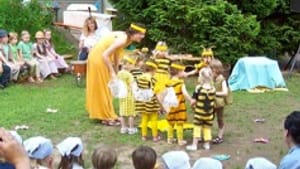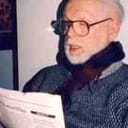Stay in the Loop
BSR publishes on a weekly schedule, with an email newsletter every Wednesday and Thursday morning. There’s no paywall, and subscribing is always free.
A fresh start in Germany
Back to the future in Germany

Yesterday my six-year-old son Danny made his dramatic debut before several hundred adults celebrating the 20th anniversary of the Johannes Falk Kindergarten in Weimar, Germany. Danny and his chum Gerda Grimm played homeless children whom Falk (1768-1826) mercifully housed.
(That ultimately explained my puzzlement at another kindergartner sitting next to Danny with a grand top hat and formal suit: He played Falk saving the homeless kids.)
Falk was born the second of seven children in Danzig, now in Poland. His father was a poor-law guardian and a wigmaker by trade. Falk could afford only three years of elementary school— he had to help his father in the wig workshop. At age 17 he returned to what we call a high school and graduated at age 22.
Respected but controversial
In 1791 Falk studied theology at the University of Halle/Saale (my German wife's hometown). The city of Danzig paid his tuition. He became interested in classical antiquity, literature and politics. As famous a German writer as Cristoph Martin Wieland (he tutored the duke's son) was impressed by Falk's satire (The Princess and the Pig Snout) and his journalism. He quit his graduate studies and became a freelance writer.
In 1797 Falk married Caroline Rosenfeld and moved to Weimar. There he became a respected but controversial figure in the court and in the city because of his ironic and satiric style. In 1806 he became a translator and advisor for Napoleon's French troops.
In 1813 Falk decided to become the "father of orphans" after four of his own children died in short succession. He and the court preacher Karl Friedrich Horn founded the "Society of Friends in Need," an agency for homeless and delinquent children. He wrote the words in 1816 for the famous German Christmas carol "O, Du Fröhliche" (Oh, You Merry Folk). In 1821 Falk bought the "Luther House" (the famous Protestant Reformer spent some nights in Weimar as an Augustinian monk).
Falk lived in downtown Weimar, where in 2001 he would ultimately receive the city's town highest honor: a suite named after him (Room 128 in the grand Elephant Hotel, built in 1697).
An educational model
When he died in 1824, Falk's wife and a former student, George Rettner, carried on his social work. In 1827, it was turned over to the city after which it became the model for social-educational establishments like Martinsstift in Erfurt and Rauhes-Haus in Hamburg.
The daylong kindergarten celebration encouraged parents, grandparents and friends to participate in creative hobbies. (Whenever they weren't successfully attacking tables replete with food and drinks.) Whatever evils the German Democratic Republic inflicted on the East German population at large, I can attest that its kindergartens, at last, give the next generation a powerful push.♦
To read a response, click here.
(That ultimately explained my puzzlement at another kindergartner sitting next to Danny with a grand top hat and formal suit: He played Falk saving the homeless kids.)
Falk was born the second of seven children in Danzig, now in Poland. His father was a poor-law guardian and a wigmaker by trade. Falk could afford only three years of elementary school— he had to help his father in the wig workshop. At age 17 he returned to what we call a high school and graduated at age 22.
Respected but controversial
In 1791 Falk studied theology at the University of Halle/Saale (my German wife's hometown). The city of Danzig paid his tuition. He became interested in classical antiquity, literature and politics. As famous a German writer as Cristoph Martin Wieland (he tutored the duke's son) was impressed by Falk's satire (The Princess and the Pig Snout) and his journalism. He quit his graduate studies and became a freelance writer.
In 1797 Falk married Caroline Rosenfeld and moved to Weimar. There he became a respected but controversial figure in the court and in the city because of his ironic and satiric style. In 1806 he became a translator and advisor for Napoleon's French troops.
In 1813 Falk decided to become the "father of orphans" after four of his own children died in short succession. He and the court preacher Karl Friedrich Horn founded the "Society of Friends in Need," an agency for homeless and delinquent children. He wrote the words in 1816 for the famous German Christmas carol "O, Du Fröhliche" (Oh, You Merry Folk). In 1821 Falk bought the "Luther House" (the famous Protestant Reformer spent some nights in Weimar as an Augustinian monk).
Falk lived in downtown Weimar, where in 2001 he would ultimately receive the city's town highest honor: a suite named after him (Room 128 in the grand Elephant Hotel, built in 1697).
An educational model
When he died in 1824, Falk's wife and a former student, George Rettner, carried on his social work. In 1827, it was turned over to the city after which it became the model for social-educational establishments like Martinsstift in Erfurt and Rauhes-Haus in Hamburg.
The daylong kindergarten celebration encouraged parents, grandparents and friends to participate in creative hobbies. (Whenever they weren't successfully attacking tables replete with food and drinks.) Whatever evils the German Democratic Republic inflicted on the East German population at large, I can attest that its kindergartens, at last, give the next generation a powerful push.♦
To read a response, click here.
Sign up for our newsletter
All of the week's new articles, all in one place. Sign up for the free weekly BSR newsletters, and don't miss a conversation.

 Patrick D. Hazard
Patrick D. Hazard